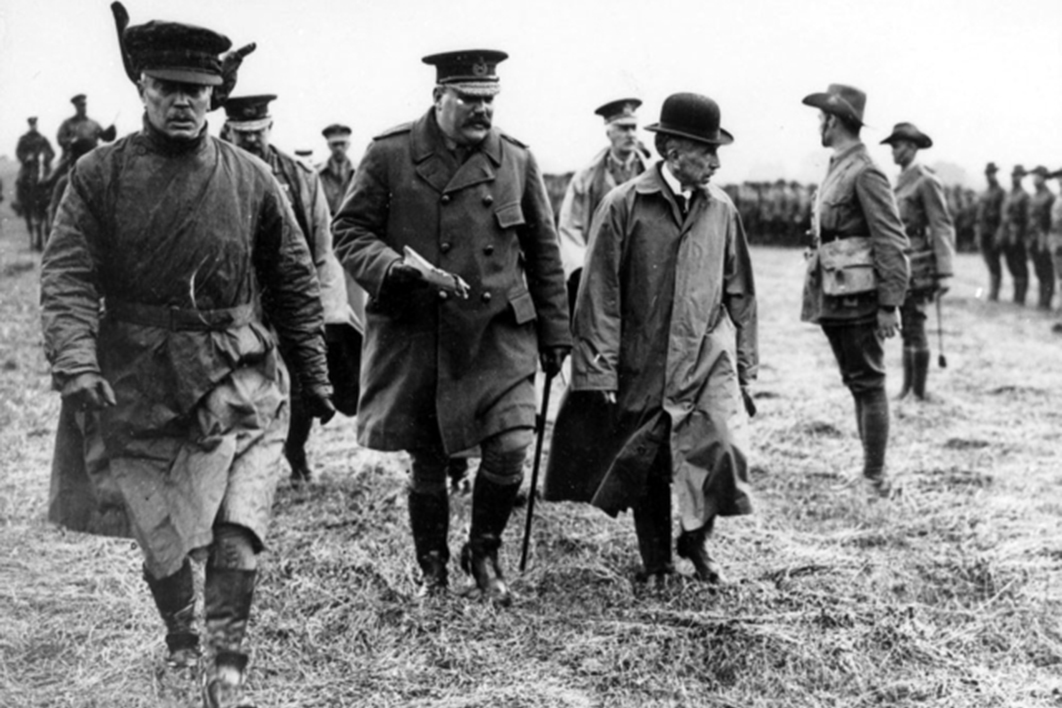“It is a maxim that ‘ignorance of the law is no excuse,’” wrote Sir Robert Garran on his retirement in 1932, “but it must certainly have been hard for good citizens in those days to know when they might be disobeying.” The former federal solicitor-general was commenting on the sometimes-confusing laws introduced in Australia during the first world war — laws he was in many cases responsible for drafting.
The same might be said of Australians faced with the wave of laws and public health orders issued in recent weeks by state, territory and federal governments to meet the challenges of the Covid-19 pandemic. Just a few days ago, one state held in-person voting for local elections and by-elections while other states were prohibiting public or private gatherings of more than ten people. Then the federal government banned meetings of two or more people, though it is up to the states and territories to determine how the rule will be enforced and what punishments will apply.
Even state police appear unaware of the extent of or limits on their powers, with Greens NSW MP David Shoebridge reporting via Twitter that fines have been issued for offences against physical distancing that are, in fact, not offences. Yet community understanding of these new restrictions is essential, not only to ensure compliance but also to ensure that those who impose them are held accountable.
Not everyone stuck to the rules Sir Robert was recalling. Prime minister W.M. “Billy” Hughes was “egged” at the train station in Warwick, Queensland. Women took to the streets of Melbourne demanding reasonable prices for food. A German-born man, resident in Australia for more than two decades, refused to be interned in a concentration camp without knowing the reason. Each of these incidents resulted in small amendments to the already extensive legal regime that intimately shaped the lives of the Australian community from 1914 until long after the last gunshots were fired on Armistice Day, 1918.
Law has always been crucial to Australia’s involvement in war, whether through existing defence legislation or new provisions designed to deal with a developing incident or conflict. Law provides the framework upon which all wartime defence, economic and social policies and decisions are built. Yet most of us remain unaware of law’s foundational role, because it has generally — and often intentionally — been overlooked in Australian war history.
Exhibit A: Australia during the War, volume eleven of the twelve-volume Official History of Australia in the War of 1914–1918. That book was penned by Ernest Scott, a professor of history at the University of Melbourne, and the series itself was edited by Charles Bean, Australia’s official war correspondent, who had been appointed by the government to produce an extended account of Australia’s involvement in the recent conflict.
Originally the journalist Thomas Heney had been contracted to write Scott’s volume under the title The Effort in Australia. Although Heney completed the first few chapters quite quickly, Bean was dissatisfied with his work and around 1924 approached other writers, including Scott, to assist with the volume. Heney resolved to finish the book but in early 1928 resigned from the project on account of ill health; he died later that year. Scott agreed to take over.
In mid 1928 Scott sent Bean a table of contents with his vision for The Effort in Australia, comprising five “books” — essentially thematic parts, each with multiple chapters — mapping out the different aspects of life in Australia during the war. Book IV, “The Citizen and the War,” included a chapter on the “Legislative and Judicial.” As noted in his accompanying letter, the addition of a dedicated chapter on law was Scott’s idea. Bean concurred, commenting on how the wartime federal and state governments were almost completely unified, “partly through the War Precautions Act and the Defence Act.” He thought it “extraordinary how smoothly this revolution was effected under the constitution of the Commonwealth,” though he acknowledged that it “was designed largely to meet this contingency.”
Bean’s use of the word “revolution” here is interesting, for in many senses it was. This was not a traditional revolution of the people against the government, but rather a legal revolution of a government against its people, motivated by a higher cause: victory in war.
Aware of the intricacy and importance of the legal chapter, Scott suggested an alternative author: Professor Kenneth Bailey, also of the University of Melbourne. Five years later, though Bean received the necessary permissions to include Professor Bailey on the project, the chapter remained unwritten. In 1933 Bailey contacted Bean to see whether he should continue on the project; the next year, when Scott’s manuscript was being finalised, the work still had not been produced.
At the same time, Scott and Bean availed themselves of an offer too good to refuse: a promise by Sir Robert Garran to read the manuscript of the now-renamed Australia during the War. During the war Garran had been secretary of the Attorney-General’s Department and then federal solicitor-general, responsible for drafting wartime statutes and regulations while also overseeing the administration of those laws.
As the correspondence between Bean and Scott reveals, however, in addition to commenting on the typescript, Garran also helped Bean resolve an outstanding issue. In a letter to Scott dated 1 June 1934, Bean noted that Garran had “question[ed]… the necessity or advisability for a legal chapter,” adding that Bean himself “had for some time been strongly impelled towards the same view.” The previous day Bean had written to Bailey, confirming the decision to scrap the chapter, citing Garran’s view that it was “doubtful if such a chapter is called for, and that any omissions could quite easily be made good in the text.”
It is clear from these letters that Garran’s opinion was not the sole factor in the decision to omit the legal chapter in Australia during the War. Nor was Garran the only person with a potential conflict of interest consulted during the creation of the Official History. Billy Hughes and many other politicians, along with military men directly involved in the war effort in Australia and abroad, read chapters of the Official History prior to publication. Some did so at Bean’s request; others demanded the privilege.
By that point, little had been written about Australia’s law during the war. A few articles had been published in law journals: one penned by future prime minister Robert Menzies, another co-authored by future opposition leader and justice of the High Court of Australia, H.V. Evatt. Garran also referred to some wartime constitutional issues in a 1924 journal article. But there had been no detailed discussion or interrogation of these laws; and now, in 1934, the opinion of the man who wrote the majority of Australia’s wartime laws was a deciding factor in omitting a sustained examination of them from the Official History.
Yet, despite the only cursory mentions of law in Australia during the War, it remains the pre-eminent account of Australia’s legal regime during the first world war. While law has been mentioned in subsequent social and political histories, and the details of the Commonwealth War Precautions Act and its myriad regulations have rarely been discussed.
More recently, some legally focused scholarship, considering one specific law or aspect, has begun to appear, largely during the centenary period. Work by historian Jo Hawkins, in addition to my own book, Anzac: The Landing, the Legend, the Law, explored the historical and continuing legal control over use of the word “Anzac.” Articles by teacher and historian Tony Cunneen examined how the legal profession was affected by and contributed to the war effort. Journal articles on topics such as anti-shouting laws, and restrictions on protests and use of enemy-owned intellectual property have also appeared, among others. But these previous works have each mapped only one small, discrete part of the overall legal picture. There has been no holistic examination of Australia’s first world war legal regime, a gap I aim to help fill with my new book, Law in War.
A number of reasons might explain such an omission. Law itself is often seen as dull. Stories of the wartime regulations that required people to seek permission from the defence minister to buy tin plates, or restrictions on how much local bakers could charge for a loaf of bread, are not as inspirational or nation-building as the 1915 Gallipoli landing or the 1917 Battle of Beersheba. The overly formal and often impenetrable language used in legislation is also an understandable deterrent.
Given that much of Australia’s wartime legal regime came from Britain, at least during the early stages, it might be argued that there is no need to consider Australian law as a distinct entity. As influential as British law was, however, Australia’s legal regime and wartime experiences were specific to this nation. Writing on the Australian treatment of “the enemy at home,” for example, historian Peter Monteath commented that “since Federation in 1901 Australia was increasingly making its own decisions about what kind of country it wished to be and who should be permitted to live here.” This manifested itself in Australia’s treatment of “aliens” both during and after the war.
Further, while this might seem a controversial claim, Australia as a nation is generally not comfortable with acknowledging or accepting responsibility for mistakes and injustices, particularly at an institutional level. Australians had already experienced two and a half years of life under Australia’s wartime legal regime, their newspapers censored and their neighbours taken to internment camps, when they returned Hughes to power in the 1917 federal election. The treatment of Indigenous Australians, equal parts destruction and discrimination, is another striking, shameful example of a situation that other Australians ignored; during the war, the law continued to humiliate Indigenous and Chinese people, and others of “non-European” descent, by denying them the ability to enlist and serve their country, using a statute that actually pre-dated the war.
Australia may ultimately have been on the side of the victors, but the trinity of war-focused legislation passed by the federal parliament during this period — the War Precautions Act, the Commonwealth Trading with the Enemy Act and the Commonwealth Unlawful Associations Act, and the many regulations enacted under those statutes — arguably went beyond what was necessary for success in wartime. John Locke famously stated that “where-ever law ends, tyranny begins”; in first world war Australia, law perpetuated a form of tyranny in the name of victory. Not that Garran would agree with such a statement: “I doubt whether tyrannical power was ever more untyrannically exercised” than by himself and Hughes, he commented in his memoir, Prosper the Commonwealth.
As part of a 1999 speech, former High Court justice and governor-general Sir William Deane publicly apologised to the German-Australian community for what it had experienced during the two world wars. In what historian Gerhard Fischer has, in my view correctly, described as a “little-known apology,” Deane stated in part:
The tragic, and often shameful, discrimination against Australians of German origin fostered during the world wars had many consequences. No doubt, some of you carry the emotional scars of injustice during those times as part of your backgrounds or family histories. Let me as governor-general say to all who do how profoundly sorry I am that such things happened in our country.
Law made this treatment possible. Between 1914 and 1918 it was used as a tool against certain individuals born and resident in this country, for the purposes of discrimination, oppression, censorship, and deprivation of property, liberty and basic human rights. This legal regime created a deep injustice that, for the most part, remains undocumented and unacknowledged. Such claims might sound like hyperbole, but Law in War documents the humiliation, discrimination and scandal inflicted upon eight individuals living in Australia during the first world war, enabled by laws created in the name of the war effort.
In 1920, when the federal government eventually withdrew the laws that enabled many of the restraints adopted in the first world war, it also reintroduced some that it had found convenient or helpful. Some of those offences — such as the restrictions on the use of the word “Anzac” — remain in force today, or have inspired modern-day regulation in areas including sedition, detention and deportation. Today, we might expect the restrictions that have governed daily life during the pandemic to be repealed. But public vigilance is needed now more than ever, and we can learn from these wartime experiences to ensure that the rights and freedoms that have been willingly sacrificed in the name of public health are fully restored when the pandemic has passed. •
This article is adapted from Law in War: Freedom and Restriction in Australia during the Great War, by Catherine Bond, released this week by NewSouth Publishing.




